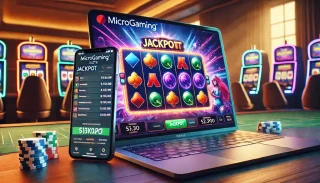Gambling has been a part of human culture for millennia, tracing its roots back to ancient civilizations where dice were rolled and bets were placed on everything from chariot races to gladiatorial combat. What began as a rudimentary pastime rooted in physical spaces—taverns, saloons, and eventually grand casinos—has undergone a seismic shift thanks to technology. The journey from classic gambling to the digital age is a story of innovation, adaptation, and reinvention. Today, the industry stands at the intersection of tradition and modernity, offering experiences that would have been unimaginable just a few decades ago. Technology hasn’t just enhanced gambling; it has fundamentally redefined it, turning a once-localized activity into a global phenomenon accessible to anyone with an internet connection.

The driving force behind this transformation is the relentless march of technological progress. From the clunky mechanical slot machines of the 19th century to the sleek, algorithm-driven platforms of 2025, each advancement has pushed the boundaries of what gambling can be. The rise of the internet brought casinos into living rooms, mobile devices put them in our pockets, and emerging tools like virtual reality (VR) and blockchain are now shaping a future where gambling is more immersive, secure, and personalized than ever. This evolution reflects broader societal shifts—our growing reliance on digital solutions, our demand for convenience, and our fascination with cutting-edge entertainment. In this exploration, we’ll dive into how technology has reshaped the gambling industry, tracing its path from physical roots to a digital frontier and peering into what lies ahead.
The Rise of Online Gambling
The advent of the internet in the late 20th century was a watershed moment for gambling, marking the beginning of its digital era. In 1994, the Caribbean nation of Antigua and Barbuda passed the Free Trade & Processing Act, allowing licenses to be granted to companies wanting to open online casinos. That same year, Microgaming, a software company still prominent today, developed the first fully functional online gambling platform. InterCasino, launched in 1996, became one of the earliest pioneers, offering a handful of games like blackjack and slots to a curious, tech-savvy audience. This was a radical departure from the traditional casino model, which relied on physical spaces filled with flashing lights, ringing bells, and the clatter of chips. Suddenly, players no longer needed to travel to Las Vegas or Monte Carlo—they could log in from their desktop computers and place bets in their pajamas.
The impact of this shift was profound and far-reaching. Online gambling democratized access, breaking down geographical and social barriers that had once limited participation. By the early 2000s, hundreds of online casinos had sprung up, offering a dizzying array of games—poker, roulette, baccarat, and more—all enhanced by improving graphics and faster internet speeds. Today, in 2025, the global online gambling market is a juggernaut, projected to surpass $100 billion annually, according to industry analysts. This growth isn’t just about numbers; it’s about experience. As gambling expert John Smith observed,
“Technology has turned gambling into a personalized, on-demand activity, where players can tailor their environment and stakes to their preferences.”
Features like live dealer games, where real croupiers are streamed to players in real-time, have blurred the lines between physical and virtual, while innovations like random number generators (RNGs) ensure fairness in a way that physical dice or cards never could. The rise of online gambling didn’t just expand the industry—it reinvented it, setting the stage for even more transformative changes.
One standout example of how gambling has embraced digital innovation is 1win, a platform that seamlessly combines sports betting, casino games, and modern technology into a single, accessible ecosystem. With its sleek mobile app, broad cryptocurrency support, and a user-first approach to design, 1win perfectly illustrates the industry’s shift toward flexibility, speed, and personalization. In 2025, platforms like 1win are not just adapting to trends—they’re setting new standards for what digital gambling experiences can and should offer.

Key Technological Milestones in Gambling
To fully grasp how technology has revolutionized gambling, it’s worth examining some of the pivotal innovations that have marked this journey. The table below outlines five key milestones, each representing a leap forward in how gambling is played, accessed, and experienced. These developments are distinct from the broader trends discussed earlier, focusing instead on specific breakthroughs that have left a lasting imprint on the industry.
| Innovation | Year Introduced | Impact on Gambling |
|---|---|---|
| Mechanical Slot Machines | 1891 | Introduced automation, making gambling faster and more accessible in public venues |
| Online Casinos | 1994 | Shifted gambling to the digital realm, enabling global reach and 24/7 availability |
| Mobile Gambling Apps | Early 2010s | Allowed players to gamble anytime, anywhere, boosting convenience and engagement |
| Blockchain Technology | 2010s | Improved security and transparency with decentralized payments and provably fair games |
| Virtual Reality Casinos | Late 2010s | Created immersive 3D environments, enhancing the sensory experience of gambling |
These milestones tell a story of progression. The mechanical slot machine, invented by Charles Fey in 1891, was a marvel of its time—a coin-operated device with spinning reels that paid out winnings automatically. It laid the groundwork for modern slots, which now dominate both physical and online casinos. Fast forward to the 1990s, and online casinos took that automation to a new level, leveraging the internet to eliminate the need for physical infrastructure. By the 2010s, mobile apps capitalized on the smartphone boom, turning gambling into a portable pastime—today, over 60% of online gambling revenue comes from mobile devices, per recent industry reports.
Blockchain and VR represent the cutting edge. Blockchain’s introduction brought cryptocurrencies like Bitcoin into the fold, offering players anonymity and faster transactions while ensuring game outcomes could be verified for fairness. Meanwhile, VR casinos, pioneered by companies like SlotsMillion, let players don headsets and step into virtual gaming halls, complete with interactive tables and lifelike avatars. These innovations don’t just enhance gambling—they redefine it, proving that technology is the industry’s lifeblood, constantly pushing it into new dimensions.
The Future of Gambling Technology
As remarkable as these past changes have been, the future promises even more disruption. Artificial intelligence (AI) is already making waves, analyzing player data to offer personalized game recommendations, optimize betting strategies, and even detect signs of problem gambling before they escalate. Imagine an AI-powered casino that knows you prefer high-stakes poker over slots and adjusts its interface accordingly—or one that gently nudges you to take a break if your betting patterns suggest distress. This level of customization and care is unprecedented, blending entertainment with responsibility in ways traditional casinos never could. By 2025, AI is expected to be a standard feature across major platforms, with companies like Bet365 and DraftKings already investing heavily in these tools.
Blockchain’s influence is also deepening. Beyond secure payments, it’s enabling entirely new models like decentralized casinos, where players bet directly against each other without a central operator taking a cut. This peer-to-peer approach, powered by smart contracts, is gaining traction in 2025, appealing to tech-savvy gamblers who value transparency and lower fees. Meanwhile, virtual and augmented reality (AR) are poised to take immersion further. VR casinos are evolving beyond novelty, with platforms now offering multi-player environments where friends can meet up digitally to play. AR, on the other hand, could overlay gambling elements onto the real world—picture a poker table projected onto your kitchen counter or a slot machine appearing in your local park. As tech visionary Sarah Lee predicts,
“The next decade will blur the lines between gaming and gambling, creating hybrid experiences that captivate a new generation.”
This convergence of technology and creativity is set to redefine not just how we gamble, but why we do.
Here are some trends to watch:
- AI-driven personalization: Tailored game suggestions and responsible gambling alerts.
- AR-enhanced live games: Real-world overlays for a seamless blend of physical and digital play.
- Crypto-based loyalty programs: Rewards in digital currencies for frequent players, redeemable across platforms.
A New Era of Play
The gambling industry’s evolution is a testament to technology’s power to transform. From the clinking coins of mechanical slots to the silent, secure transactions of blockchain, each step has made gambling more accessible, engaging, and innovative. As we stand in 2025, the industry is no longer confined to physical spaces or even traditional digital platforms—it’s a dynamic ecosystem where players can choose their level of immersion, from a quick mobile bet to a fully virtual casino adventure. The future holds endless possibilities, and one thing is clear: technology will remain the driving force, shaping gambling into an experience that’s as diverse as the players it serves.
The Most Significant Innovations in Online Casinos
Online casinos have come a long way since their inception, evolving from basic digital platforms into sophisticated ecosystems that rival the excitement of their brick-and-mortar counterparts. While the broader gambling industry has seen sweeping technological changes, the innovations specific to online casinos deserve a spotlight of their own. These advancements have not only improved gameplay but also redefined how operators attract, retain, and entertain players in a fiercely competitive market. From seamless payment systems to gamified rewards, the online casino landscape of 2025 is a showcase of ingenuity and player-centric design.

What sets these innovations apart is their focus on enhancing the digital experience in ways physical casinos cannot replicate. Unlike traditional venues, where the ambiance relies on tangible elements like decor and live interactions, online platforms have leveraged technology to create unique value propositions. This section delves into the most groundbreaking developments that have elevated online casinos, exploring how they’ve transformed user engagement, trust, and enjoyment in the virtual space.
Pioneering Features That Redefined Online Play
One of the standout innovations in online casinos is the advent of gamification, a concept that integrates game-like elements into non-gaming contexts. Unlike traditional casino games that focus solely on winning or losing, gamified platforms introduce missions, leaderboards, and achievement badges to keep players hooked. Take Casumo, for example, a trailblazer in this space since the early 2010s. Players on Casumo don’t just spin reels—they embark on “adventures,” earning points and unlocking rewards as they progress through levels. This approach taps into the psychology of gaming, making every session feel like a journey rather than a series of isolated bets. By 2025, gamification has become a staple across many platforms, with operators reporting up to 30% higher retention rates among players engaged in these interactive systems.
Another game-changer is the development of advanced payment solutions tailored for online casinos. Early platforms relied on slow bank transfers or credit card payments, often plagued by delays and security concerns. Today, innovations like e-wallets (PayPal, Skrill), instant bank transfers, and even biometric payment authentication have streamlined the process. A notable leap came with the rise of pay-by-phone billing, where players can deposit funds directly via their mobile carrier—simple, fast, and ideal for small transactions. As fintech expert Laura Chen remarked,
“The shift to frictionless payments has been a quiet revolution in online casinos, removing barriers and building trust with every tap.”
These systems not only speed up deposits and withdrawals but also cater to a global audience with diverse financial preferences, ensuring inclusivity in a way physical casinos struggle to match.
Cutting-Edge Tools Shaping the Casino Experience
Beyond gamification and payments, online casinos have embraced tools that elevate the sensory and social aspects of play. One such innovation is the integration of 3D graphics and cinematic animations, turning basic games into visual spectacles. Slot games, once limited to static symbols and simple spins, now feature intricate storylines and high-definition visuals akin to video games. NetEnt’s “Gonzo’s Quest,” launched years ago but refined by 2025, exemplifies this trend—players follow an animated explorer through a virtual jungle, with cascading reels and dynamic effects that make each win feel cinematic. This focus on aesthetics has attracted younger demographics who expect entertainment value beyond mere payouts, pushing developers to blur the lines between gambling and interactive storytelling.

Social features have also emerged as a significant innovation, addressing the isolation often associated with online play. Multiplayer games and chat functionalities allow users to connect in real-time, replicating the camaraderie of a physical casino table. Platforms like PokerStars have long offered multiplayer poker rooms, but newer casinos are taking it further with “social slots” and virtual lounges where players can team up, compete, or simply chat while spinning. In 2025, some sites even host live tournaments with streaming capabilities, letting players broadcast their sessions to followers—a nod to the influencer culture dominating digital spaces. These features transform online casinos from solitary experiences into vibrant communities, fostering a sense of belonging that keeps players coming back.
Innovations Driving Trust and Fairness
| Innovation | Year Popularized | Key Benefit |
|---|---|---|
| Provably Fair Algorithms | Mid-2010s | Allows players to verify game fairness independently |
| Two-Factor Authentication | Early 2020s | Enhances account security with dual verification |
| Anti-Fraud AI Systems | 2020s | Detects suspicious activity in real-time |
| Transparent RTP Displays | Late 2010s | Shows players the exact return-to-player percentage |
| Self-Exclusion Tools | 2010s | Empowers responsible gambling with easy opt-outs |
These trust-building tools have had a tangible impact. A 2024 survey by Gambling Insider found that 78% of online casino players prioritize platforms with visible fairness and security measures, up from 55% a decade ago. This shift reflects a maturing industry that understands credibility is as valuable as entertainment. By addressing player concerns head-on, these innovations have turned online casinos into spaces where fun and integrity coexist, setting a new standard for digital gambling.
What’s Next for Online Casino Innovation
The horizon for online casinos is brimming with potential, driven by technologies still in their infancy. One promising area is the use of haptic feedback devices, which could let players “feel” the spin of a slot or the shuffle of cards through vibrations in their controllers or wearables. Imagine gripping a device that mimics the tension of pulling a lever or the weight of stacking chips—such sensory enhancements could elevate online play to a near-physical level. Early prototypes are already in testing by 2025, with companies like HaptX partnering with casino developers to bring this vision to life.
Another frontier is the rise of voice-activated gaming. With smart assistants like Alexa and Google Home now ubiquitous, some casinos are experimenting with voice commands—“Spin the wheel!” or “Double my bet!”—to make play more intuitive. This hands-free approach appeals to multitasking players and those with accessibility needs, broadening the audience further. As innovator Mark Daniels predicts,
“Voice will be the next interface for casual gambling, turning online casinos into something you can enjoy while cooking dinner or driving.”
Combined with AI chatbots that respond to player queries in real-time, this could make casinos more conversational and user-friendly than ever.
Here’s a glimpse of what’s brewing:
- Haptic feedback integration: Physical sensations for digital games.
- Voice-controlled betting: Seamless play through spoken commands.
- Dynamic bonus systems: Real-time rewards based on player behavior.
The most significant innovations in online casinos aren’t just about flashy features—they’re about reimagining how players interact with the digital world. As these advancements unfold, they’ll continue to distinguish online platforms from their physical predecessors, cementing their place as the future of gambling.
The Rise of Mobile and Crypto Gambling
The gambling landscape has witnessed a dramatic shift in recent years, propelled by two powerhouse trends: the explosion of mobile technology and the integration of cryptocurrencies. What was once an activity tied to desktops or physical venues has broken free, finding a new home in the palms of players’ hands and the decentralized world of digital currencies. By 2025, mobile devices and crypto wallets have become the twin engines driving gambling’s accessibility, security, and appeal, reshaping how millions engage with their favorite games. This rise isn’t just a footnote in the industry’s history—it’s a bold new chapter that reflects our increasingly connected and tech-driven lives.

Mobile and crypto gambling didn’t emerge in isolation; they’re products of broader societal changes. The proliferation of smartphones has turned them into all-purpose tools, while the growing distrust in traditional financial systems has fueled the adoption of blockchain-based solutions. Together, they’ve created a perfect storm for gambling innovation, offering players unprecedented freedom and flexibility. Whether it’s spinning a slot on a lunch break or placing a crypto bet from halfway across the globe, these trends have made gambling faster, more private, and more inclusive than ever before. Let’s explore how this dual revolution has unfolded and what it means for the future.
Mobile and Crypto: A Game-Changing Duo
The rise of mobile gambling kicked off in earnest in the early 2010s, when smartphones became powerful enough to handle complex apps and high-speed internet became widely available. Operators quickly seized the opportunity, launching dedicated apps and mobile-optimized websites that brought the casino experience to users on the go. By 2025, mobile gambling accounts for over 70% of online casino revenue, according to industry data—a staggering leap from its niche beginnings. This shift isn’t just about convenience; it’s about redefining when and where gambling happens, turning idle moments into opportunities for play.
Cryptocurrency entered the scene a bit later, gaining traction in the mid-2010s as Bitcoin and Ethereum proved their staying power. Online casinos like FortuneJack and Stake embraced crypto, offering players a way to deposit, wager, and withdraw without relying on banks or traditional currencies. This appealed to a tech-savvy crowd seeking anonymity and speed, bypassing the red tape of conventional payments. The table below captures the key milestones in this dual ascent, showing how mobile and crypto have converged to transform gambling.
| Development | Year Introduced | Impact on Gambling |
|---|---|---|
| First Mobile Casino Apps | 2010 | Brought gambling to smartphones, boosting access |
| Bitcoin Gambling Platforms | 2013 | Introduced decentralized, anonymous betting |
| 4G Network Expansion | Mid-2010s | Enabled seamless mobile gaming with faster speeds |
| Crypto Wallet Integration | Late 2010s | Simplified crypto transactions for casual players |
| 5G Rollout | 2020s | Enhanced mobile streaming and real-time play |
These milestones highlight a synergy: mobile tech provides the platform, while crypto offers the fuel. 5G, for instance, has supercharged mobile gambling with low-latency connections, making live games and instant payouts smoother than ever. Meanwhile, crypto wallets have turned complex blockchain transactions into user-friendly taps, democratizing access to this once-niche payment method.
The Impact and Future of Mobile-Crypto Gambling
The impact of mobile and crypto gambling extends far beyond technical upgrades—it’s reshaping player behavior and industry dynamics. On the mobile front, apps have introduced features like push notifications for bonuses, geolocation-based promotions, and one-tap betting, keeping players engaged around the clock. A 2024 study by Gambling Analytics found that mobile users gamble 40% more frequently than desktop players, thanks to the ease of access. This has spurred operators to prioritize mobile-first designs, with sleek interfaces and lightweight apps that cater to users on older devices in emerging markets like India and Africa.
Platforms like tiranga https://tiranga-games-app.org/, for instance, are capitalizing on this momentum by combining mobile-first design with seamless crypto integration tailored for emerging markets.

Crypto gambling, meanwhile, has carved out a distinct niche by addressing pain points like privacy and trust. Players can now wager without sharing personal data, a boon in regions with strict gambling laws or unreliable banking systems. Beyond Bitcoin, altcoins like Litecoin and stablecoins like USDT have broadened the appeal, offering lower fees and price stability. As crypto advocate Michael Torres puts it,
“Cryptocurrency has given gambling a layer of freedom that fiat never could—it’s the ultimate player empowerment tool.”
This freedom has also attracted a younger demographic, with 18-34-year-olds making up 60% of crypto casino users in 2025, per recent surveys.
Looking ahead, the fusion of mobile and crypto is set to accelerate. Here are three trends to watch:
- Mobile-exclusive crypto games: Titles designed solely for smartphone users, leveraging blockchain for unique rewards.
- Example: NFT-based slots where winnings include digital collectibles.
- Example: Quick-play crypto lotteries optimized for mobile screens.
- Cross-platform wallets: Seamless crypto transfers between mobile apps and desktop sites.
- Example: A single wallet syncing your Bitcoin across multiple casinos.
- Example: Instant conversions from fiat to crypto within the app.
- Enhanced mobile security: Biometric logins and blockchain encryption for safer play.
- Example: Fingerprint scans to access your crypto balance.
- Example: Smart contracts ensuring payouts can’t be tampered with.
The future might also see “crypto cashouts” tied to mobile location—imagine withdrawing winnings in Bitcoin at a partnered ATM while traveling. This blend of convenience and innovation is pushing gambling into uncharted territory.
Here’s what players love most about mobile gambling:
- Flexibility to play anywhere—on a bus, at a café, or in bed.
- Instant access to thousands of games without bulky hardware.
- Personalized alerts for time-sensitive offers.
And here’s why crypto is gaining ground:
- No middlemen—direct, fast transactions with minimal fees.
- Privacy-first design—no need to link bank accounts or IDs.
- Global reach—play from anywhere without currency conversion hassles.
The rise of mobile and crypto gambling isn’t just a trend—it’s a paradigm shift. As smartphones become more powerful and blockchain more mainstream, this duo will continue to redefine the stakes, making gambling a truly modern pursuit.




